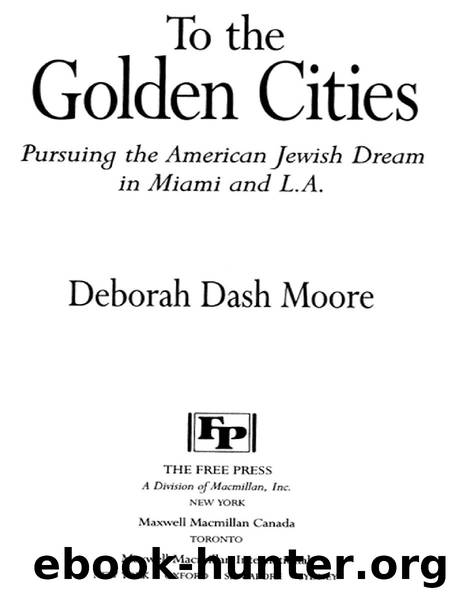To the Golden Cities by Deborah Dash Moore

Author:Deborah Dash Moore
Language: eng
Format: epub
Publisher: The Free Press
Published: 1994-07-15T00:00:00+00:00
7
Choosing Sides
It was somehow arranged that we did not face the common enemy with a united front. In the end, many of us were persuaded to place the knife in others’ backs.
—CLANCY SIGAL “Hollywood During the Great Fear,” Present Tense (Spring 1982)
Miami Jews transplanted their political faith into an environment shaped and defined by conflict between blacks and whites. Although the process transformed them, their politics, and their city of choice, Jews could find many common grounds for unity. In Los Angeles the situation was different. There the newcomers engaged in bitter intramural struggles to achieve the unity that emerged. However, unlike Miami Jews, whose sense of entitlement was often tempered by the segregationist sentiment of their city, Los Angeles Jews shared a sense of commonality of purpose at the end of World War II that drew them together irrespective of their political beliefs. From Republican stalwarts on the right to devoted Democrats in the center to zealous communists on the left, Los Angeles Jews adopted a common political agenda. Together with other American Jews in the Northeast and Midwest, they embraced the ideal of one world at peace, and they imagined a unique role for Jews in world affairs as a freedom-loving people, staunchly opposed to fascism. They accepted as well the Zionist solution of an independent Jewish commonwealth as the answer to the problem of the displaced persons. At home, Los Angeles Jews championed a broad antidiscrimination program to eliminate American antisemitism and racism. They pushed for legislation to outlaw discrimination in employment, supported fair housing, and opposed segregated schools and quotas in education. This was, they thought, the political agenda of true Americanism; as the feisty editorialist, labor Zionist Samuel Gach, put it: “Certainly what’s good for the Jew can never conflict with what’s good for the nation!” 1
The cold war, however, severely tested their definitions of Americanism and their assumption that the inclusiveness that was good for the Jews was good for the nation. Congressional and state un-American activities committees plunged Los Angeles Jews into a bitter internal struggle that not only upset their political agenda and chastened the Jewish community but also challenged their definition of an American Jew.
The early postwar unanimity of Los Angeles Jews was apparent in activities ranging from voting patterns to sponsorship of rallies on behalf of DPs to resolutions passed by the central Los Angeles Jewish Community Council, an organization which included virtually the entire spectrum of Los Angeles’s Jewish groups. The council provided L.A. Jews with a democratic body in which communal policy could be debated, political positions voted upon, and leadership openly contested. Theorists and ideologues had argued for years that American Jews deserved democratic institutions for their communal self-government rather than the elitist organizations that dominated the communal scene. 2 Despite the theory and occasional nod toward democratic practice, the Los Angeles Jewish Community Council remained a relatively rare egalitarian phenomenon in American Jewish life. In December 1944 the council had set the stage for its future political role when it voted to democratize representation.
Download
This site does not store any files on its server. We only index and link to content provided by other sites. Please contact the content providers to delete copyright contents if any and email us, we'll remove relevant links or contents immediately.
| African-American Studies | Asian American Studies |
| Disabled | Ethnic Studies |
| Hispanic American Studies | LGBT |
| Minority Studies | Native American Studies |
Cecilia; Or, Memoirs of an Heiress — Volume 1 by Fanny Burney(31333)
Cecilia; Or, Memoirs of an Heiress — Volume 3 by Fanny Burney(30934)
Cecilia; Or, Memoirs of an Heiress — Volume 2 by Fanny Burney(30889)
The Great Music City by Andrea Baker(21313)
We're Going to Need More Wine by Gabrielle Union(18073)
Bombshells: Glamour Girls of a Lifetime by Sullivan Steve(13108)
Pimp by Iceberg Slim(12931)
All the Missing Girls by Megan Miranda(12748)
Fifty Shades Freed by E L James(12451)
Norse Mythology by Gaiman Neil(11883)
Talking to Strangers by Malcolm Gladwell(11878)
Crazy Rich Asians by Kevin Kwan(8349)
Mindhunter: Inside the FBI's Elite Serial Crime Unit by John E. Douglas & Mark Olshaker(7834)
The Lost Art of Listening by Michael P. Nichols(6474)
Enlightenment Now: The Case for Reason, Science, Humanism, and Progress by Steven Pinker(6405)
Bad Blood by John Carreyrou(5769)
The Four Agreements by Don Miguel Ruiz(5511)
Weapons of Math Destruction by Cathy O'Neil(5037)
We Need to Talk by Celeste Headlee(4869)
